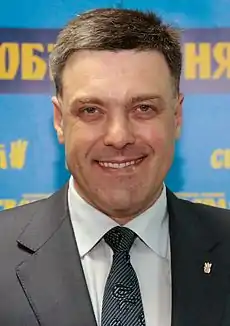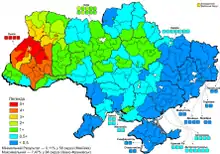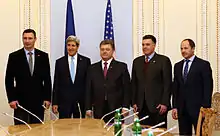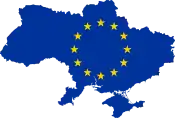Oleh Tyahnybok
Oleh Yaroslavovych Tyahnybok (Ukrainian: Оле́г Яросла́вович Тягнибо́к, born 7 November 1968) is a Ukrainian politician who is a former member of the Verkhovna Rada and the leader of the nationalist far-right Svoboda political party.[4][5] Previously he was elected councilman of the Lviv Oblast Council for the second session.[6]
Oleh Tyahnybok | |
|---|---|
Олег Тягнибок | |
 | |
| Leader of the All-Ukrainian Union "Svoboda" | |
| Assumed office 14 February 2004 | |
| Preceded by | Yaroslav Andruschkiv |
| Deputy of the Lviv Oblast Council | |
| 2nd session | |
| In office 1994–1998 | |
| Constituency | Independent |
| People's Deputy of Ukraine | |
| 3rd convocation | |
| In office 12 May 1998 – 14 May 2002 | |
| Constituency | Social-National Party, Lviv Oblast, District No.119[1] |
| 4th convocation | |
| In office 14 May 2002 – 25 May 2006 | |
| Constituency | Social-National Party (till Feb. 14, 2004), Svoboda, Lviv Oblast District No.120[2] |
| 7th convocation | |
| In office 12 December 2012 – 27 November 2014 | |
| Constituency | Svoboda, No.1[3] |
| Personal details | |
| Born | 7 November 1968 Lviv, Ukrainian SSR, Soviet Union |
| Political party | All-Ukrainian Union Svoboda |
| Spouse(s) | Olha Tyahnybok (née Demchyschyn) |
| Children | Jaryna-Maria (1992) Daryna-Bohdana (1995) Hordiy (1997) |
| Occupation | Urologist, politician |
| Website | http://www.tyahnybok.info/ |
Biography
Tyahnybok was born in the city of Lviv to a family of doctors and is a doctor himself.[7][8] His father, Yaroslav Tyahnybok, a Merited Doctor of Ukraine, was a distinguished sports doctor, chief physician of the Soviet national boxing team, and a former boxer himself who achieved the title of the Master of Sports of the USSR.[9] Oleh's great-grandfather was a brother of Lonhyn Tsehelsky, a politician in the West Ukrainian People's Republic.[7] Tyahnybok states he remembers from when he was younger searches conducted by the agents of the KGB in his family's apartment.
After secondary school, Tyahnybok enrolled into the Lviv Medical Institute and received part-time medical jobs as a corpsman and nurse, but after the second year was drafted to the army. After returning to the institute, he initiated the creation of the Med Institute Student Brotherhood - the first step in his life as a civil activist. Tyahnybok graduated from the institute in 1993 as a qualified surgeon (as he sometimes mentions, majoring in urology). In 1994 25-year-old Tyahnybok was elected to the Lviv Oblast Council, and in 1998 he was elected to the Verkhovna Rada.
Political career
In October 1991 Tyahnybok became a member of the Social-National Party of Ukraine.[10] He is characterised as representative of Ukraine's far right. From 1994 until 1998, Tyahnybok served as a member of the Lviv Regional Council.[11] In 1998, Tyahnybok was first elected to the Ukrainian Parliament as a member of Social-National Party of Ukraine;[10] in the parliament he became a member of the People's Movement of Ukraine faction.[10] In 2002, Tyahnybok was reelected to the Ukrainian parliament as a member of Victor Yushchenko's Our Ukraine bloc.[10] In parliament he submitted 36 motions for debate, but the parliament adopted only four of them.[12] In the majority of his motions, he opposed the introduction of the Russian language as the second official state language; proposed recognition of the fighting role of the Organization of Ukrainian Nationalists and Ukrainian Insurgent Army during World War II; called for the lustration (regulation of political involvement) of former communist officials, security service officers and undercover agents; and demanded the prohibition of communist ideology.[12] None of these motions were adopted.[12]
On 20 July 2004 Tyahnybok was expelled from the Our Ukraine parliamentary faction[10][13] after he made a speech in the Carpathian Mountains at the gravesite of a commander of the Ukrainian Insurgent Army.[13] In the speech, which was aired on television in the summer of 2004, he made comments such as,[14] "[You are the ones] that the Moscow-Jewish mafia ruling Ukraine fears most[13]" and "They were not afraid and we should not be afraid. They took their automatic guns on their necks and went into the woods, and fought against the Muscovites, Germans, Jews and other scum who wanted to take away our Ukrainian state.[12]:226"
In his defence Tyahnybok said he had not offended Russians in calling them an occupying force, as this was based on historical fact. He also denied that he was anti-Semitic, saying he was rather pro-Ukrainian.[15][16] The prosecutor's office initially filed criminal charges for inciting ethnic hatred, but later withdrew for lack of evidence. Since that time Tyahnybok has won nine court cases in that regard. By the decisions of courts it was recognized that the criminal case was raised unlawfully, and the actions of TV-channel "Inter" that showed the footage of Tyanybok's speech as well as the Head of the Derzhkomnatsmihratsia H. Moskal were recognized as ones that insult the honor and dignity of Oleh Tyahnybok and caused him moral damage. The actions around that issue led to creation of the "Program in defense of Ukrainians". Tyahnybok stated in 2012 "this speech is relevant even today" and "All I said then, I can also repeat now".[6]
Since February 2004 Tyahnybok has headed the All-Ukrainian Union "Freedom".[11]
In April 2005, Tyahnybok co-signed an open letter to President Yushchenko calling for a parliamentary investigation into the "criminal activities of organized Jewry in Ukraine."[6][17]
Tyahnybok stood as a candidate for the post of Mayor of Kyiv during the 2008 Kyiv local election in 2008.[12] In the elections Leonid Chernovetskyi was reelected with 37.7% of the vote, while Tyahnybok received 1.37% of the vote.[12][18]

Tyahnybok was a candidate for President of Ukraine in the 2010 presidential election for the All-Ukrainian Union "Freedom" party. He received 352,282 votes, or 1.43% of the total.[19] He received most of his votes in the Halychyna oblasts--Lviv oblast, Ternopil Oblast and Ivano-Frankivsk Oblast—and his vote share in this region amounted to five percent of the total ballots cast.[20] In the second round, Tyahnybok did not endorse a candidate. He did present a list of some 20 demands that second round candidate Yulia Tymoshenko had to fulfil first before gaining his endorsement - which included publicizing alleged secret deals Tymoshenko had with Vladimir Putin and ridding herself of what he called Ukraine-haters in her close circles.[21]
During the 2010 Ukrainian local elections Tyahnybok's party won between twenty and thirty percent of the votes in Eastern Galicia where it became one of the main forces in local government.[7][22]
During the 2012 Ukrainian parliamentary election Tyahnybok was re-elected (he was top candidate on his party list) to the Ukrainian parliament when his party won 38 seats.[23][24][25] Tyahnybok was elected leader of the party's parliamentary faction.[26]
In June 2013, Tyahnybok and another Svoboda Party leader were barred from entering the U.S. for their open anti-Semitism, according to the Kyiv-based newspaper Sevodnya.[27]

In March 2014 Russia launched a criminal case against Tyahnybok, and some members of Ukrainian National Assembly – Ukrainian National Self Defence for "organizing an armed gang" that had allegedly fought against the Russian 76th Guards Air Assault Division in the First Chechen War.[28]
In the 2014 Ukrainian presidential election he received 1.16% of the vote.[29] In the October 2014 parliamentary election Tyahnybok was again first on the election list of his party; since the party came 0,29% short to overcome the 5% threshold to win seats on the nationwide list he was not re-elected into parliament.[30][31]
On 14 October 2018, Tyahnybok announced he would not take part in the 2019 Ukrainian presidential election but that his party had instead decided to nominate Ruslan Koshulynskyi as the candidate of nationalist political forces.[32] In the election Koshulynskyi received 1.6% of the votes.[33]
In the 2019 Ukrainian parliamentary election Tyahnybok is placed first on the joined list of Svoboda with National Corps, the Governmental Initiative of Yarosh and Right Sector.[34] But in the election they won 2.15% of the votes, less than half if the 5% election threshold, and thus no parliamentary seats via the national party list.[35]
Political positions
— Tyahnybok in a January 2010 interview with Business Ukraine
Tyahnybok regards Russia as Ukraine's biggest threat.[14] He has accused the Medvedev presidency of "waging virtual war on Ukraine along many fronts – in the information sphere and the diplomatic sector, within the energy trade and throughout the world of international PR spin.".[7] He is pro-NATO and critical of the European Union, but supports a Europe of free nations. According to polls both stances put him at odds with the majority of Ukrainians.[14] Tyahnybok also wants to deprive Crimea of its autonomous status and Sevastopol of its special status.[36][37]
Tyahnybok wants to introduce an "ethnicity" section into Ukrainian passports, start a visa regime with Russia, and require Ukrainians to pass a Ukrainian language test to work in the civil service.[38]
Tyahnybok wants to re-establish Ukraine as a nuclear power.[38] He believes this would stop the "Russian virtual war on Ukraine".[7]
Tyahnybok wants Ukrainian to be the official state language of Ukraine, but also believes there should be no discrimination against linguistic minorities.[39]
Cultural and political image

During a visit by Tyahnybok to Sevastopol on 6 January 2010, some 1,500 activists of parties and public movements picketed the Business and Culture Center where Tyahnybok had a meeting with voters.[40]
Tyahnybok was voted Person of the Year for 2012 by readers of the country's leading news magazine, Korrespondent.[6] Tyahnybok was ranked #43 in the 2012 list of "Top 100 Most influential Ukrainians" by Korrespondent.[41]
See also
References
- "People's Deputy of Ukraine of the III convocation". Official portal (in Ukrainian). Verkhovna Rada of Ukraine. Retrieved 22 December 2014.
- "People's Deputy of Ukraine of the IV convocation". Official portal (in Ukrainian). Verkhovna Rada of Ukraine. Retrieved 22 December 2014.
- "People's Deputy of Ukraine of the VII convocation". Official portal (in Ukrainian). Verkhovna Rada of Ukraine. Retrieved 22 December 2014.
- Tiahnybok reelected Svoboda party head, Kyiv Post (8 December 2012)
- , a former candidate for President of Ukraine Kyiv Post. 22 November 2012. ''Svoboda tames radicals to get into parliament'' Article written by Katya Gorchinskaya
- Svoboda: The rise of Ukraine's ultra-nationalists, BBC News (26 December 2012)
- (archived) Ukrainian nationalist leader thriving in hard times, Business Ukraine (January 20, 2011)
- Gorchinskaya, Katya. "Svoboda tames radicals to get into parliament". Kyiv Post. Retrieved 22 November 2012.
- "1984: радянський фільм про батька Тягнибока". Ukrayinska Pravda (in Ukrainian). December 13, 2012. Retrieved May 20, 2013.
- (in Ukrainian) Олег Тягнибок, Ukrinform
- Political Pulse: Presidential field takes shape, Kyiv Post (11 November 2009)
- Shekhovtsov, Anton (2011). "The Creeping Resurgence of the Ukrainian Radical Right? The Case of the Freedom Party". Europe-Asia Studies. 63 (2): 203–228. doi:10.1080/09668136.2011.547696. (source also available here)
- Yushchenko Finally Gets Tough On Nationalists, The Jamestown Foundation (3 August 2004)
- Tyahnybok: Nationalist, fearful of Russia, favors NATO, Kyiv Post (29 October 2008)
- Interview published in the Ukrainian newspaper Silski Visti on 13 August 2004, source: Ukrainian MP denies inciting racial hatred., accessmylibrary.com (17 August 2004)
- Ukrainian party picks xenophobic candidate Archived 2012-06-09 at the Wayback Machine, Jewish Telegraphic Agency (25 May 2009)
- http://www.ncsj.org/AuxPages/042005Ukr_letter.shtml%5B%5D Ukraine Notables Sign Anti-Semitic Letter, Anti-Semitism in Ukraine, NCSJ, 04.20.2005
- Liang, Yan (May 29, 2008). "Ukraine's Kiev mayor wins re-election". www.chinaview.cn. Xinhua. Archived from the original on February 18, 2009. Retrieved 2008-06-16.
- (in Ukrainian) ЦВК оприлюднила офіційні результати 1-го туру виборів, Gazeta.ua (25 January 2010)
- (in Ukrainian) Election results and map by region, Ukrainska Pravda (4 February 2010)
- Tymoshenko’s Looming Defeat: How Did She Make It Inevitable? Archived 2013-11-11 at the Wayback Machine, Serhiy Kudelia (29 January 2010)
- Local government elections in Ukraine: last stage in the Party of Regions’ takeover of power, Centre for Eastern Studies (4 October 2010)
- Q&A:Ukrainian parliamentary election, BBC News (23 October 2012)
- Ukraine election:President Yanukovych party claims win, BBC News (29 October 2012)
- Parties spend over Hr 600 million on elections, according to report, Kyiv Post (16 November 2012)
- Five factions, including Communist Party, registered in parliament, Kyiv Post (12 December 2012)
- [Ukrainian Far Right Nationalists Barred From U.S. for Anti-Semitic Hatred http://forward.com/articles/179415/ukrainian-far-right-nationalists-barred-from-us-fo/#ixzz3TzHrdPDj]
- http://en.interfax.com.ua/news/general/195991.html
- "Poroshenko wins presidential election with 54.7% of vote - CEC". Radio Ukraine International. 29 May 2014. Archived from the original on 29 May 2014.
(in Russian) Results election of Ukrainian president, Телеграф (29 May 2014) - Poroshenko Bloc to have greatest number of seats in parliament Archived 2014-11-10 at the Wayback Machine, Ukrainian Television and Radio (8 November 2014)
People's Front 0.33% ahead of Poroshenko Bloc with all ballots counted in Ukraine elections - CEC, Interfax-Ukraine (8 November 2014)
Poroshenko Bloc to get 132 seats in parliament - CEC, Interfax-Ukraine (8 November 2014) - (in Ukrainian) Party list All-Ukrainian Union "Freedom", Ukrayinska Pravda (3 October 2014)
- (in Ukrainian) "Svoboda" will nominate to the presidency not Tyahnybok, Ukrayinska Pravda (14 October 2018)
- Zelenskiy wins first round but that’s not the surprise, Atlantic Council (4 April 2019)
- https://m.glavcom.ua/country/politics/yarosh-tyagnibok-bileckiy-taki-sformuvali-jediniy-spisok-na-vibori-600508.html
- CEC counts 100 percent of vote in Ukraine's parliamentary elections, Ukrinform (26 July 2019)
(in Russian) Results of the extraordinary elections of the People's Deputies of Ukraine 2019, Ukrayinska Pravda (21 July 2019) - Tyahnybok: Crimean autonomy should be cancelled, Inter~Media (August 12, 2008)
- Nationalist presidential candidate in Ukraine calls for downgrading Crimea status, Kyiv Post (7 January 2010)
- Tiahnybok’s virulent brand of nationalism shows no strength, Kyiv Post (14 January 2010)
- The Media War Behind the Ukraine Crisis, The Moscow Times (11 March 2014)
- 1,500 activists of over 10 parties protest arrival of nationalist leader in Sevastopol, Kyiv Post (6 January 2010)
- "43 место Олег Тягнибок". Korrespondent (in Russian). Archived from the original on May 14, 2013. Retrieved May 20, 2013.
External links
| Wikimedia Commons has media related to Oleh Tyahnybok. |
